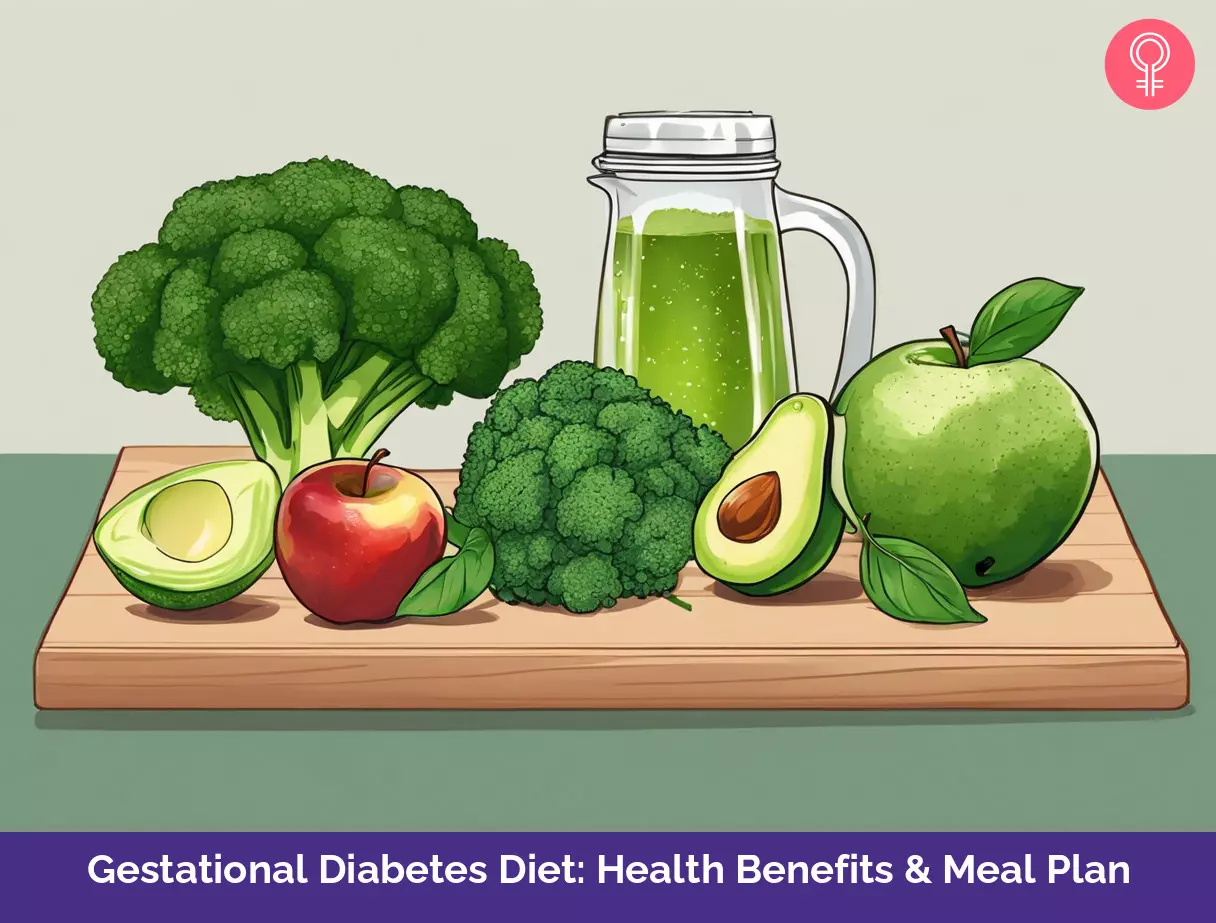Gestational Diabetes Diet: Health Benefits & Meal Plan
Discover how the right dietary plan can help manage gestational diabetes.

Image: Shutterstock
Gestational diabetes usually may develop during pregnancy and may alter how your body handles blood sugar. While it is a common concern among expectant mothers, many worry if it may impact the baby’s health. This is where one may consider the gestational diabetes diet. This diet promotes the intake of foods that do not cause sudden glucose spikes. It is important to manage gestational diabetes as it may otherwise lead to excessive birth weight or increase the mother’s risk of developing type 2 diabetes (1), (2). In this article, we will further discuss the benefits of this diet. We will also look at a sample meal plan among other important aspects of this diet. Continue reading.
 At A Glance: Gestational Diabetes Diet
At A Glance: Gestational Diabetes Diet- Principle: Consumption of foods that help regulate blood sugar levels during pregnancy
- Purpose: To manage blood sugar levels during pregnancy
- Who It Is For: Pregnant women diagnosed with gestational diabetes or those at risk
- Duration: Short-term.
- Who Should Avoid: Pregnant women with a history of kidney problems or kidney stones
- Cons: May cause dry mouth, fatigue, constipation, nausea, and nutritional deficiencies
In This Article
What Is Gestational Diabetes?
Gestational diabetes is a type of diabetes that develops during pregnancy due to hormonal changes that affect insulin sensitivityi The body's ability to respond effectively to insulin, the hormone that helps regulate the body’s blood sugar levels (2). It typically occurs in the second or third trimester. Those who are older, or have a higher body mass index (BMI)i A medical formula that uses a person’s body weight and height to determine their body fat and severity of obesity , a history of gestational diabetes mellitus (GDM), or have first-degree relatives with diabetes could be at a higher risk (3). Such high blood sugar levels can lead to preeclampsiai A pregnancy complication characterized by high blood pressure and organ damage that may occur after the 20th week of pregnancy and cause the baby to have excessive birth weight (4), (5). A glucose intolerance test is conducted between the 24th and 28th weeks of pregnancy to check for gestational diabetes.
Gestational diabetes management involves diet, exercise, and medication to control blood sugar levels. The doctor may monitor your blood sugar levels after the baby’s birth to check for type 2 diabetes. Most women with gestational diabetes have healthy pregnancies and return to having normal blood sugar levels after childbirth.
A customized diet is key to managing gestational diabetes. Learn more about such a diet in the next section.
Key Takeaways
- The gestational diabetes diet helps manage blood sugar levels during pregnancy by promoting the consumption of whole grains, fiber-rich foods, and lean proteins.
- It encourages the consumption of starchy vegetables and healthy fats and limits sugary fruits and carbohydrates.
- It may help reduce the risk of preeclampsia and fetal macrosomia and improve maternal and fetal health.
What Is The Gestational Diabetes Diet?

The gestational diabetes diet is a type of pregnancy diet specifically designed to help manage blood sugar levels during pregnancy. However, there is more to the pregnancy diet that you must explore and discuss with your doctor before finalizing anything.
It promotes the consumption of whole grains, healthy fats, lean proteins, and vegetables to provide energy and balanced nutrition and to reduce blood sugar spikes. It also encourages the intake of high-fiber foods to aid in digestion and stabilize blood sugar levels (6). It limits sugary beverages and encourages the consumption of water or sugar-free beverages to maintain adequate hydration.
The diet also promotes the intake of small, more frequent meals to prevent sudden blood sugar spikes. However, remember, effective management of gestational diabetes requires speaking with a qualified dietician or nutritionist. To maintain the health of both the mother and the fetus, these professionals may offer customized meal plans, educate you on food choices, and track your progress.
While this diet helps manage gestational diabetes, it also offers other important benefits. Learn more in the next section.
Gestational Diabetes Diet Benefits
1. Regulates Blood Sugar Levels

The intake of high-fiber foods and small, frequent meals may help stabilize blood sugar levels and reduce the risk of preterm delivery and pregnancy hypertensioni High blood pressure that develops after the 20th week of pregnancy and may cause sudden weight gain and dizziness (7).
2. May Reduce The Risk Of Fetal Macrosomia
Gestational diabetes is associated with high insulin levels in the fetus, which may increase the risk of fetal macrosomia (abnormally large baby) (8). Consumption of high-fiber foods can help regulate blood sugar levels and lower the risk of weight gain in the baby (9).
3. May Lower The Risk Of Preeclampsia
Women with gestational diabetes have an increased risk of developing preeclampsia (10). This diet may reduce that risk by stabilizing blood sugar levels.
4. May Aid In Healthy Weight Gain

Sticking to the weight gain recommendations from your doctor during pregnancy, (while a woman with normal weight must have a weight gain around 17–25 kg during pregnancy, a woman who is overweight must have a weight gain around 14–23 kg, and woman who is obese must have weight gain around 11–19 kg) (11). This approach may reduce the risk of fetal macrosomia and stillbirth (12). The gestational diabetes diet promotes the consumption of lean protein, whole grains, and healthy fats. These may also help promote healthy weight gain in the baby and minimize complications.
5. May Improve Fetal Health
Poor maternal nutrition is associated with low birthweight and restricted fetal growth (13). The diet promotes the consumption of lean proteins, healthy fats, and whole grains that ensure maternal nutritional needs. This, in turn, promotes optimal growth, health, and development of the baby.
6. May Lower The Risk of Low Blood Sugar
The gestational diabetes diet promotes the intake of fiber-rich foods. These slow down the absorption of carbohydrates and help stabilize postprandial glucose levelsi Blood sugar levels within 4 hours after having a meal, which serve as an indicator of your metabolic health (14).
As we saw, this diet offers a range of health benefits. Starting this diet is fairly simple. In the following section, we discuss the foods you can start consuming.
Foods To Eat With Gestational Diabetes
- Non-Starchy Vegetables: Leafy greens like spinach, kale, lettuce, broccoli, cauliflower, bell peppers, cucumbers, and zucchini
- Starchy Vegetables (in moderation): Sweet potatoes, corn, and peas
- Fruits: Berries, apples, pears, citrus fruits, cherries, and kiwi
- Lean Proteins: Chicken, turkey, lean cuts of beef or pork, salmon, trout, tofu, lentils, and chickpeas
- Dairy And Dairy Alternatives: Low-fat yogurt, skim milk, and unsweetened almond milk
- Whole Grains (in moderation): Quinoa, brown rice, and whole wheat pasta
- Healthy Fats: Avocado, nuts, and olive oil
- Snacks (in moderation): Greek yogurt, hummus, and low-fat cheese
- Beverages: Water and herbal tea
- Herbs and Spices: Cinnamon, turmeric, and ginger.
 Quick Tip
Quick TipIn addition to consuming these foods, you also need to avoid certain foods to achieve effective results. Learn what they are in the next section.
Foods To Avoid With Gestational Diabetes

- Simple Carbohydrates: White bread, white rice, regular pasta, cereals, soda, and fruit juices
- Fruits: Watermelon, grapes, mangoes, and pineapple
- Snacks: Sugary snacks and candies
- Vegetables: Carrots and butternut squash
- Processed Foods: Fried chicken, sausages, bacon, hot dogs, and processed meats
- Sugary Dairy Foods: Flavored yogurt, ice cream, and sweetened milk alternatives
Incorporating the right foods into your diet and avoiding the wrong foods is the first step. To make this process further easier for you, we have included a sample meal plan in the next section. Check it out.
Gestational Diabetes Diet Sample Meal Plan
Day 1
| Meal | Food Items |
|---|---|
| Breakfast | Scrambled eggs made with 2 large eggs, ½ cup of fresh spinach, and 2 tablespoons of feta cheese |
| Mid-Morning Snack | ½ cup of Greek yogurt with 1 tablespoon of almonds and a sprinkle of ground cinnamon |
| Lunch | 2 turkey and avocado lettuce wraps made with 1-2 turkey slices per wrap, ½ sliced avocado, 1-2 lettuce leaves per wrap, and 2 slices each of cucumber and tomatoes |
| Afternoon Snack | 2 sliced bell peppers with 20 grams of hummus |
| Evening Snack | ½ cup of low-fat cottage cheese with ½ cup of pineapple chunks |
| Dinner | 4-6 ounces of baked salmon with ½ cup of quinoa salad and lemon and dill sauce |
Day 2
| Meal | Food Items |
|---|---|
| Breakfast | Vegetable omelet made with 2 large eggs, ¼ cup each of diced bell peppers and onions, and 2 tablespoons of crumbled feta |
| Mid-Morning Snack | ½ cup of low-fat cottage cheese with 80 grams of mixed berries |
| Lunch | 2 cups of spinach and chickpea salad made with ½ cup of chickpeas, 4-5 slices of tomatoes, 4-5 slices of cucumber, and ½ cup of diced bell peppers with lemon and tahini dressing |
| Afternoon Snack | 2 sliced red bell peppers with 3 teaspoons of hummus |
| Dinner | 80-100 grams of grilled lemon herb chicken with 1 cup of quinoa salad, and balsamic vinegar dressing |
| Evening Snack | ½ cup of Greek yogurt parfait topped with berries and almonds |
Day 3
| Meal | Food Items |
|---|---|
| Breakfast | 1 small bowl of oatmeal with ½ sliced banana and 8-10 almonds |
| Mid-Morning Snack | A handful of mixed nuts and dried fruits |
| Lunch | 1 bowl of lentil and vegetable soup |
| Afternoon Snack | ½ cup of low-fat cottage cheese with a ¼ teaspoon of cinnamon and 80 grams of blueberries |
| Dinner | 4-6 ounces of baked chicken thighs with 150 grams of roasted vegetables |
| Evening Snack | 1 sliced cucumber with 3 teaspoons of hummus |
 Quick Tip
Quick TipFrequently Asked Questions
How can I manage cravings while on a gestational diabetes diet?
Focus on nutritious snacks high in protein or healthy fats to control cravings while following a gestational diabetes diet. These foods also assist in maintaining stable blood sugar levels. Planning meals and snacks helps avoid impulsive, less nutrient-dense choices, and maintaining proper hydration and stress management can also lessen cravings.
Can I still enjoy sweet treats occasionally on a gestational diabetes diet?
While occasional indulgences in sweet treats are allowed, it is better to consult a dietitian to consider the portion sizes and meal timings. You can always opt for sugar-free sweets to satisfy your sweet cravings.
Is physical activity important for managing gestational diabetes?
Yes, engaging in moderate-intensity exercise five times a week may help manage gestational diabetes and reduce the risk of weight gain (2), (15). Consult your healthcare provider for suitable exercises to ensure they align with your specific health needs.
Can I breastfeed with gestational diabetes?
Yes, you can breastfeed with gestational diabetes. Breastfeeding may help reduce the risk of breast and ovarian cancers in the premenopausal period (16). It may also reduce the risk of upper respiratory tract infections and diarrhea in infants (17). However, make sure your blood sugar levels are under control before you feed. Research suggests that high maternal glucose may pass into the milk and increase the risk of hypoglycemia in the infant (18). Also, consult your healthcare provider for any dietary adjustments, if needed.
Can gestational diabetes affect my baby’s health?
Uncontrolled gestational diabetes may increase the risk of macrosomia (larger birth weight) and potential complications during childbirth like difficult labor or preeclampsia. Proper management of your blood sugar levels through diet and professional guidance can help minimize these risks.
Will I need to continue this diet after pregnancy?
Your healthcare provider will assess your blood sugar levels after pregnancy. If they return to normal, you may no longer have to follow the gestational diabetes diet. It is important to remember that a healthy diet and lifestyle are key to maintaining your overall health.
Are there any long-term risks associated with gestational diabetes?
Yes, women with a history of gestational diabetes may have a higher risk of developing type 2 diabetes later in life. Regular check-ups and a healthy lifestyle can help reduce this risk.
Can gestational diabetes affect the timing or method of labor and delivery?
Yes, uncontrolled gestational diabetes may increase the risk of emergency C-section or preterm delivery (3), (19). While the exact mechanism behind this is still not known, consult your healthcare provider to help monitor the well-being of you and your child.
Can stress affect blood sugar levels during pregnancy with gestational diabetes?
Yes, stress causesinsulin resistancei The body’s inability to respond to the insulin hormone, which often leads to elevated blood sugar levels and decreased insulin secretion, which may lead to high blood sugar levels during pregnancy (20). Engage in relaxation techniques and regular physical activity, and seek professional help to maintain stable blood sugar levels during pregnancy.
Illustration: Gestational Diabetes Diet: Health Benefits & Meal Plan

Image: Stable Diffusion/StyleCraze Design Team
A tailored dietary approach can help manage gestational diabetes. Check out this video for simple and delicious recipes that ensure you meet your nutritional requirements during pregnancy.
References
Articles on StyleCraze are backed by verified information from peer-reviewed and academic research papers, reputed organizations, research institutions, and medical associations to ensure accuracy and relevance. Read our editorial policy to learn more.
- Association of gestational diabetes mellitus with offspring weight status across infancy: a prospective birth cohort study in China
https://bmcpregnancychildbirth.biomedcentral.com/articles/10.1186/s12884-020-03494-7 - Gestational Diabetes
https://www.ncbi.nlm.nih.gov/books/NBK545196/ - Gestational diabetes mellitus: Major risk factors and pregnancy-related outcomes: A cohort study
https://www.ncbi.nlm.nih.gov/pmc/articles/PMC8548751/# - Preeclampsia and Diabetes
https://www.ncbi.nlm.nih.gov/pmc/articles/PMC4317712/ - The association of gestational diabetes mellitus with fetal birth weight
https://pubmed.ncbi.nlm.nih.gov/29907325/# - Effects of Additional Dietary Fiber Supplements on Pregnant Women with Gestational Diabetes: A Systematic Review and Meta-Analysis of Randomized Controlled Studies
https://www.ncbi.nlm.nih.gov/pmc/articles/PMC9658588/ - Diet and Healthy Lifestyle in the Management of Gestational Diabetes Mellitus
https://www.ncbi.nlm.nih.gov/pmc/articles/PMC7599681/# - Macrosomia
https://www.ncbi.nlm.nih.gov/books/NBK557577/# - Dietary intake in pregnant women with pre-gestational diabetes mellitus and effects on pregnancy outcome
https://bora.uib.no/bora-xmlui/bitstream/handle/1956/22852/Dietary-intake-in-pregnant-women-with-pre-gestational-diabetes-mellitus.pdf?sequence=1&isAllowed=y - Gestational Diabetes Mellitus and Preeclampsia: Correlation and Influencing Factors
https://www.ncbi.nlm.nih.gov/pmc/articles/PMC8889031/ - Determining Optimal Weight Gain
https://www.ncbi.nlm.nih.gov/books/NBK32801/ - Body Mass Index, Weight Gain during Pregnancy and Obstetric Outcomes
https://www.ncbi.nlm.nih.gov/pmc/articles/PMC2994149/# - The importance of nutrition in pregnancy and lactation: lifelong consequences
https://www.ncbi.nlm.nih.gov/pmc/articles/PMC9182711/# - High Fiber Diet
https://www.ncbi.nlm.nih.gov/books/NBK559033/# - The effect of exercise during pregnancy on gestational diabetes mellitus in normal-weight women: a systematic review and meta-analysis
https://bmcpregnancychildbirth.biomedcentral.com/articles/10.1186/s12884-018-2068-7 - [Breastfeeding: health benefits for child and mother]
https://pubmed.ncbi.nlm.nih.gov/25063312/ - Breastfeeding
https://www.ncbi.nlm.nih.gov/books/NBK534767 - Gestational diabetes
https://www.ncbi.nlm.nih.gov/books/NBK582729/ - Rate of Spontaneous Preterm Delivery Between Pregnant Women With and Without Gestational Diabetes
https://www.ncbi.nlm.nih.gov/pmc/articles/PMC9985512/ - Stress-Induced Hyperglycemia: Consequences and Management
https://www.ncbi.nlm.nih.gov/pmc/articles/PMC9360912/#
Read full bio of Dr. Sandeep Jassal
Read full bio of Aparna Mallampalli
Read full bio of Ravi Teja Tadimalla
Read full bio of Sindhu Koganti




























Community Experiences
Join the conversation and become a part of our empowering community! Share your stories, experiences, and insights to connect with other beauty, lifestyle, and health enthusiasts.